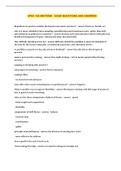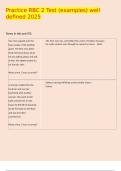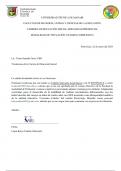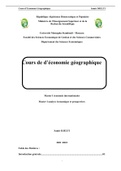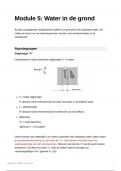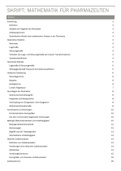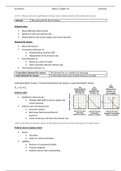Contents
Commercial Dispute Resolution.............................................................................................................1
Interim Injunctions.............................................................................................................................2
Freezing Injunctions...........................................................................................................................5
Alternatives to Litigation..................................................................................................................11
Arbitration.......................................................................................................................................13
Case Management Powers – Commercial Court..............................................................................17
Test and Feedback Exercises................................................................................................................18
Test and Feedback Workshop 1........................................................................................................18
Test and Feedback Workshop 2........................................................................................................23
Test and Feedback Workshop 3........................................................................................................31
Test and Feedback Workshop 4........................................................................................................37
Test and Feedback Workshop 5........................................................................................................42
Test and Feedback Workshop 6........................................................................................................47
Test and Feedback Workshop 7........................................................................................................56
Test and Feedback Workshop 8........................................................................................................62
1
,Interim Injunctions
- Interim injunction is an injunction pending trial
- Common in commercial cases as they are used to protect confidential and commercially
sensitive info and they guard against the dissipation of assets
- Generally only available to claimants
- Court order, breach of which is contempt of court
- Interim injunctions remain in force until trial or further order
- Very expensive as a lot of work has to be done very quickly. Generally in the region of 25K,
as often will need counsel as in high court and also need expert evidence
- Normally obtained on notice however not always because could be damaging to C – always
start with premise that it will be on notice
- Don’t have to give notice by rule 25.3(1) CPR where there are good reasons for doing so
without notice (because it would damage Cs case because they would destroy evidence or
dissipate assets etc)
- if it is realllly urgent then you can speak to judge and obtain injunction without having done
any of the paperwork and undertaking to do it later
- Generally, under s37 Senior Courts Act, injunction can be granted in all cases ‘in which it
appears to the court to be just and convenient to do so’:
1. Claimant must have locus standi – substantive cause of action
2. They are a discretionary remedy – because equitable so cannot have acquiesced to it
3. Damages must be an inadequate remedy – there must be serious harm likely to
occur or continue, harm is irreparable or cannot be quantified, or D does not have
means to pay damages
Claimant’s cross undertaking
- Claimant will usually have to make a cross undertaking as to damages
- Because interim, it is before there is an opportunity to investigate liability fully
- If at final trial the D wins the interim injunction could have caused loss and so the C should
then compensate them for that loss
- So C usually gives an undertaking to compensate D for any harm caused by injunction if it is
discharged at a later date
- ‘If the court later finds that this order has caused loss to the R, and decides that the R should
be compensated for that loss, then A will comply with any order that the court may make’
- Cs ability to meet the undertaking is taken into account, and so will usually evidence financial
position with bank statements etc
- May even be ordered to pay money into court or give some other form of security
INTERIM PROHIBITORY INJUNCTIONS
- Court more able to grant prohibitory than mandatory
- The court does not usually look at all the merits of the case, applies guidelines set out in
American Cyanamid Co v Ethicon Ltd [1975] (ONLY WHERE WILL BE TRIAL):
a) Whether there is a serious question to be tried
This is a low legal threshold as the court does not actually fully look at the merits of
the case, it is just considering whether there is a real issue between the parties
2
, Explain why the cause of action is in existence
the D will also try and say that there is no cause. However, no biggie to concede on
this as it is for the purposes of this application only and is a low threshold
b) Whether damages are an adequate remedy for either party
Would it be possible to compensate either party financially. C will say that the loss is
not quantifiable and losses will continue to arise should the action not be stopped.
This in turn will have a massive effect on reputation, and at any rate the D cannot
pay the damages
If they are allowed to continue what they are doing will this profit them so that they
may be able to pay some damages?
Damages can be quantified if you look at accounts
Should be able to continue, the C is not doing well anyway because of another factor,
so they are really just after the money
c) Also consider the impact of the Cs undertaking as to damages, and if they can
provide adequate compensation there would be ‘no reason upon this ground to
refuse an interim injunction’
What are the assets of the C
What are the assets of the D
d) Whether the balance of convenience lies in favour of granting or refusing the
application
What course of action will cause the least damage to the parties?
Where the C or D will suffer greater harm if the decision goes against him, eg:
Whether either will suffer irreparable harm eg to rep?
What is the course of action which would cause him the least harm?
If the balance does not clearly favour one party, the court will uphold the status quo
o If the C delayed in applying for the injunction, the status quo is the position
just before the application was issued
o If there was no delay, before the start of the conduct which is subject matter
of application
News Group Newspapers ltd v Mirror Group Newspapers ltd – D was advertising
under masthead of the C. C sought injunction to prevent this, which would cause
little or no harm to D but lots of harm to C had it not been granted
e) Whether there are any special factors
f) If cannot decide, does one party clearly have the stronger case?
- Approach of the courts in practice is to use this but if they cannot make a decision then
Series 5 Software says regardless if it is apparent from material available that one party’s
case is stronger then this should not be ignored
Process
- Apply on notice unless urgent R23.3(2)(b)
- Only where really urgent can you speak to judge and obtain and then undertake to do
paperwork afterwards
- Must have issued a claim form (only in exceptional circs can be done where proceedings not
issued)
- Form N244 + WS
3
, - Draft order containing terms, penal notice and cross undertaking (not obliged to but best
practice) must be filed at court R23.7(2) AND served on D not less than 3 days before hearing
of application PD25 para 2.2
- If you give in forms stamped and with the applicable fee…
- Court allocates a hearing date (usually ask for quick trial to save costs)
- Serve on the D
- D puts in evidence in reply – WS
- You then have the hearing and court decides
- If it is awarded, you get the order drawn up and stamped by the court
- This is served on the D
- If they breach this they are in contempt of court
- Give a cross undertaking to compensate if order later discharged
Varying and setting aside injunctions
- Injunction normally has clause allowing either party is at liberty to apply to vary or set aside
the order
- At any rate they will be able to if circumstances change
- If burden becomes too onerous jordan v Norfolk county council it ended up costing too much
- D may combine application to set aside with application to dismiss Cs case for want of
prosecution – because they have realised they will not win and are so delaying so that they
get the most out of the interim injunction
- May also apply to vary or set aside undertaking, but this is more difficult as they gave the
undertaking voluntarily, in Chanel v F W Woolworth, could only do so when circs changed
dramatically
- For an order without notice, the D can ask for it to be varied on return date or at any time,
usually because of non-disclosure of all material facts by C. they will then present court with
all facts and it will be assessed on American Cyanamid
- Whenever an injunction set aside, there can be claim for damages. As in Cheltenham and
Gloucester building society v Ricketts, unless obvious what have suffered there should be
another hearing
4
, Freezing Injunctions
- Right to give a freezing order comes from Mareva Compania Naviera SA v International Bulk
Carriers
- When there is a real risk that the D will dispose of their assets to avoid enforcement of any
judgment subsequently obtained by the claimant
- Usually restricted to the Ds property within the jurisdiction
- Limited in value to the likely amount at judgement (C ask for what they are claiming)
- Must be clear evidence due to how harsh they are
- Usually necessary to obtain urgently and secretly, and so done without notice R25.2(1)&(2)
- Usual cross undertaking as to damages, and compensation will be substantial if discharged so
should warn client of those risks
- Also affects 3rd parties who have to police the order for the C, if they breach then they are in
contempt
Grounds
1. Good arguable case
Since the application is made without notice, subject to the usual obligations to make
detailed investigations
Must make full disclosure of all relevant facts (both for and against) R25.3(1)
This extends to facts discovered after the making of the order, if there is a material change in
facts then the court must be informed so it decide whether to continue the order
Commercial bank of the near east
2. Risk that the property will disappear
C must show that the D has property in the jurisdiction and that they may deal with the
property in a way that will hinder the enforcement of any judgment
Does not allow them to re-write insolvency proceedings or to jump a queue
There must be clear evidence that he is a debt dodger, and that removal of assets will be
corrupt or dishonest
They will take into account the ease with which the assets can be removed
If they will move them out of the jurisdiction it will be very hard to enforce any judgment
Process
R25.3(1) – can be made without notice where court satisfied there are good reasons i.e.:
o Matter of urgency (Can even be made outside court hours (PD 25 Para. 4.5 in
extreme urgency)
o D would take steps to harm C if aware
Application may be made with draft evidence only and before a claim form has been served
Must be affidavit evidence – a WS will not suffice
Under CPR PD 25A para 1.1 only high court judges and duly authorised judges can grant a
freezing order
Outside London, a party should commence proceedings in the High Court
1. Evidence in support of the application must explain why notice not given- evidence. C must
make FULL disclosure of all facts, including those against C’s case (R25.3(1))
5

